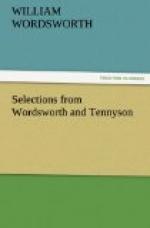In a letter to Charles James Fox the poet says: “In the two poems, The Brothers and Michael, I have attempted to draw a picture of the domestic affections, as I know they exist among a class of men who are now almost confined to the north of England. They are small independent proprietors of land, here called ‘statesmen’ [i.e., estates-men], men of respectable education, who daily labor on their little properties. . . Their little tract of land serves as a kind of rallying point for their domestic feelings, as a tablet upon which they are written, which makes them objects of memory in a thousand instances, when they would otherwise be forgotten. The two poems that I have mentioned were written to show that men who do not wear fine clothes can feel deeply.”
Edward Fulton in a A Selection of the Shorter Poems of Wordsworth (Macmillan) says: “The reason Wordsworth succeeds best in describing the type of character portrayed in Michael and The Brothers is, of course, chiefly because he knew that type best; but the fact that it was the type for which he himself might have stood as the representative was not without its effect upon him. His ideal man is but a variation of himself. As Dean Church puts it: ’The ideal man with Wordsworth is the hard-headed, frugal, unambitious dalesman of his own hills, with his strong affections, his simple tastes, and his quiet and beautiful home; and this dalesman, built up by communion with nature and by meditation into the poet-philosopher, with his serious faith and his never-failing spring of enjoyment, is himself.’ Types of character wholly alien to his own have little attraction for him. He is content to look into the depths of his own heart and to represent what he sees there. His field of vision, therefore, is a very limited one: it takes in only a few types. It is man, in fact, rather than men, that interests him.”
The poem Michael is well adapted to show Wordsworth’s powers of realism. He describes the poem as “a pastoral,” which at once induces a comparison, greatly to Wordsworth’s advantage, with the pseudo-pastorals of the age of Pope. There the shepherds and shepherdesses were scarcely the pale shadows of reality, while Wordsworth’s poem never swerves from the line of truth. “The poet,” as Sir Henry Taylor says with reference to Michael, “writes in his confidence to impart interest to the realities of life, deriving both the confidence and the power from the deep interest which he feels in them. It is an attribute of unusual susceptibility of imagination to need no extraordinary provocatives; and when this is combined with intensity of observation and peculiarity of language, it is the high privilege of the poet so endowed to rest upon the common realities of life and to dispense with its anomalies.” The student should therefore be careful to observe (1) the truth of description, and the appropriateness of the description to the




